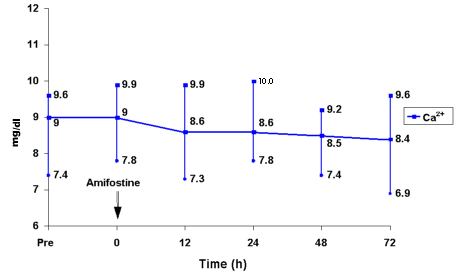Clinical trials indicate that amifostine may confer protection on various normal tissues without attenuating anti-tumor response. When administered prior to chemotherapy or radiotherapy, it may provide a broad spectrum of cytoprotection including against alkylating drugs. The mechanism of protection resides in the metabolism at normal tissue site by membrane-bound alkaline phosphatase. Toxicity of this drug is moderate with hypotension, nausea and vomiting, and hypocalcemia being observed. We report a phase II study using amifostine as a protective drug against high-dose cyclophosphamide (HDCY) (7 g/m2), used to mobilize peripheral blood progenitor cells (PBPC) and to reduce tumor burden. We enrolled 29 patients, 22 (75.9%) affected by aggressive and 7 (24.1%) by indolent non-Hodgkin's lymphoma (NHL), who were submitted to 58 infusions of amifostine and compared them with a historical group (33 patients) affected by aggressive NHL and treated with VACOP-B followed by HDCY. The most important results in favor of amifostine were the reduction of intensity of cardiac, pulmonary and hepatic toxicity, and a significant reduction of frequency and severity of mucositis (P = 0.04). None of the 29 patients died in the protected group, while in the historical group 2/33 patients died because of cardiac or pulmonary toxicity and 2 patients stopped therapy due to toxicity. Amifostine did not prevent the aplastic phase following HDCY. PBPC collection and hematological recovery were adequate in both groups. The number of CFU-GM (colony-forming units-granulocyte/macrophage) colonies and mononuclear cells in the apheresis products was significantly higher in the amifostine group (P = 0.02 and 0.01, respectively). Side effects were mild and easily controlled. We conclude that amifostine protection should be useful in HDCY to protect normal tissues, with acceptable side effects.
amifostine; cytoprotection; non-Hodgkin's lymphoma; high-dose cyclophosphamide; peripheral blood progenitor cell mobilization


